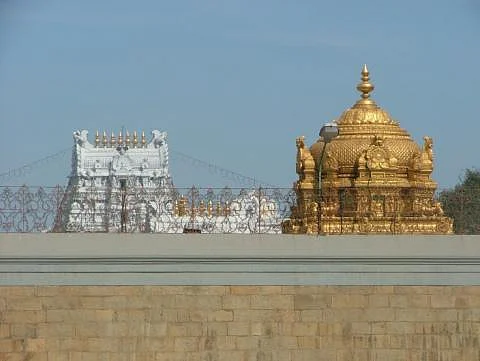

In a unique move, the body that manages the richest temple in the world, the Tirumala Tirupati Devesthanams (TTD) has opened up a demat account to accept donations in the forms of shares and securities.
Apart from cash, gold, and other costly jewelry, devotees can now send shares to Demat account 1601010000384828 which registered itself with the Stock Holding Corporation of India (SHCIL).
Officials of the Central Depositories Service Ltd (CDSL) met TTD executive officer D Sambasiva Rao in Tirumala on Monday evening to complete formalities.
The TTD's claim that they were receiving a lot of physical shares in the Hundi, which led them to accept electronic share certificates and securities, is a reminder of the amount of money that organized religion rakes in every year, which is only on the rise.
The TTD's claims are a cause of concern as the amount of money it recieves in cash and kind, (now shares) is leading it down the same path as other large tax-waived religious institutions like The Vatican.
A major source of the TTD’s income is Hundi offerings. Besides this, the sale of their famous 'ladoos' and other prasadams coupled with the sale of darshan and seva tickets also contribute to the cause.
One tenth of the temple's profits come from its sale of human hair, which is a thriving business and a million dollar empire, with the TTD even going online to auction the hair.
The overall revenue of the temple in 2014 was a staggering Rs 2,262.52 crore, amounting to roughly 6.2 crores a day.
Besides all this, the Tirumala temple has gold reserves worth at least Rs 37,000 crore. Every year, the temple also converts over 3,000 kgs of gold to gold reserve deposits with nationalised banks.
Now, lets consider The Vatican.
The Institute for the Works of Religion, more commonly known as the Vatican Bank is a private bank that sits in Vatican City and is run by a Board which reports to a Supervisory Commission of Cardinals and the Pope.
According to reports, the Vatican bank has managed to increase its profits by more than 20 times, in the last two years, officially announcing that it earned € 69.3 million (£49 million) in 2014.
Until June 2015, the Vatican bank's account books and other details were tightly sealed. After a deal with the United States, the bank has now agreed to report information about American holders of its accounts to US tax authorities.
But the Vatican still has a long way to go, to ensure transparency with state and national governments. Excessive screcy has cost the institution as it has got muddled in so many controversies that it is now the subject of listicles.
On the other hand the TTD is slightly better off, as its books are audited by the AP government. However, the present Endowments Act does not permit placing the audit report in the legislative assembly, as it is a religious institution and is not categorised as a local authority under the Panchayat Raj Act.
The TTD has also seen a little bit of controversy when it faced serious allegations over irregularities in sale of tickets for paid rituals and 'missing' antique jewellery, offered to Lord Venkateshwara in 2010. Therefore, this might be a wake up call for more transparency and for the temple board to not go the 'Vatican Way.'